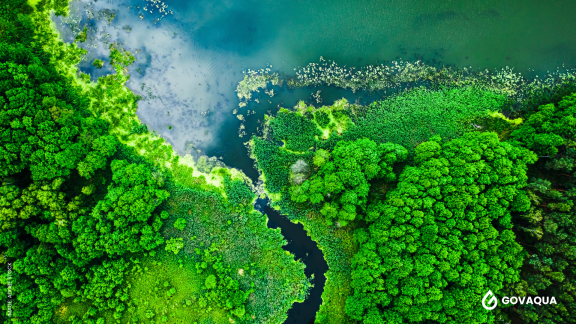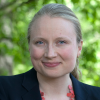

About GOVAQUA
What's on with GOVAQUA
Europe is facing water challenges ranging from water scarcity to degradation of the freshwater ecosystems. These challenges are expected to be exacerbated by climate change, growing development needs, and structural changes in sectors such as agriculture and energy. Overuse and depletion of water resources causes ecological debt, threatens livelihoods, and weakens the European economy.
Reconciling water uses and environmental needs in Europe requires a transition towards sustainable and equitable water use. This transition is also needed to reach the aims of the EU Water Framework Directive, the European Green Deal, and the United Nations Sustainable Development Goals.
Horizon Europe project GOVAQUA aims to accelerate this transition by better water governance. The GOVAQUA project will – for the first time – define what sustainability transition means in water governance and create criteria and indicators for its assessment.
GOVAQUA takes a close look at the most innovative water governance solutions to find out how they could help Europe to meet its water challenges. The project identifies the good practices related to legislation and regulation, multi-stakeholder participation and collaboration, economic and financial instruments, and digital solutions for information sharing.
These practices are systematically reviewed, analysed, and compared – and further co-developed, assessed and validated with key stakeholders in six real-world living labs in France, Finland, Spain, the UK, and Romania, and transnationally between Finland and Sweden.
Engage with GOVAQUA
Water is everybody´s business.
GOVAQUA aims to engage the many actors, decision makers and interest groups in the water field in the development of innovative governance instruments and approaches that can accelerate the transition towards sustainable and equitable water use in Europe. The project will work closely with different stakeholders especially in the six living labs where the good practises in water governance will be tried, tested, and refined. If You are interested in the living labs, feel free to contact their leaders! You can find more information about living labs and their leaders on their sub page.
GOVAQUA results will be actively shared with the river basin community of the International Network of Basin Organisations and its European regional network EURO-INBO and associated sectors, civil society, and research community. For instance, the most important results will be published as an online academy of EURO-INBO workshops. If You are interested in GOVAQUA´s partnership with EURO-INBO, contact International Cooperation Project Manager Yannick Ponchon at the International Office for Water.
GOVAQUA will also take part in relevant water events. Information about these events will be published at the project website.
The communications work in the project is led by Finnish Environment Institute. Contact: Communication Specialist Saara Sivonen.
Follow us in social media:
GOVAQUA is present at the social media, namely in LinkedIn and Bluesky.
Follow GOVAQUA in LinkedIn
Follow GOVAQUA in Bluesky
Our favoured hashtags: #GOVAQUA, #WaterGovernance2027 #WaterGovernance
Participant information for the AWS survey
Consortium
Partners and team
Finnish Environment Institute, Finland
Coordinator, main contact, Consortium co-lead Suvi Sojamo (suvi.sojamo(@)syke.fi)
Researchers: Jani Lukkarinen, Jyri Mustajoki, Vuokko Laukka, Liisa Saikkonen, Soile Oinonen, Cintia Uvo, Outi Penttilä and Jani Salminen.
Management and administration: Coordinator Eeva Karjalainen (eeva.karjalainen(@)syke.fi), Sari Väisänen and Maria Söderholm
Finance: Satu Soini and Sari Erkkilä
Communications: Saara Sivonen (saara.sivonen(@)syke.fi)
Ecologic Institute, Germany
Main Contact: Eleftheria Kampa (eleftheria.kampa(@)ecologic.eu)
Researchers: Josselin Rouillard, Ulf Stein and Jack Tarpey
Finance: Remi Beteille
University of Twente, Netherlands
Main contact: Gül Özerol (g.ozerol(@)utwente.nl)
Researchers: Cesar Casiano Flores, Joanne Vinke de Kruijf, Kris Lulofs, Veronica Junjan and Ann-Katrin Ellermann
Finances and Reporting: Jasper Lucassen
University of Cordoba, Spain
Main contact: Julio Berbel (es1bevej(@)uco.es)
Researchers: Carlos Gutierrez, Nazaret Mª Montilla and Manuel Arriaza Balmon
Administration, International Project Office: Manuel Morales
Water Technology Center, Spain
Main contact: Damián Sánchez García (dsanchezga(@)cetaqua.com)
Area manager: Manuel Argamasilla Ruiz
Researchers: Lupicinio Gracía Ortiz and Francisco Núñez Moreno
Finance, Administration and Communications: Beatriz Morales
International Office for Water, France
Main contact: Yannick Pochon (y.pochon(@)oieau.fr)
French National Research Institute for Agriculture, Food, and Environment, France
Main contact: Marielle Montginoul (marielle.montginoul(@)inrae.fr)
Reasearchers: Sebastien Loubier, Francois Molle, Sylvie Morardet, Tristan Guerin
Admistration and Finance: Sophie Leclerc
WWF Romania, Romania
Main contact: Camelia Ionescu (cionescu(@)wwf.ro)
Team: Codruța Savu
Finance: Raluca Nica
Alliance for Water Stewardship, United Kingdom
Main contact: Lisa Bunclark (Lisa Bunclark(@)a4ws.org)
Team: Christine Carey and Tyler Farrow
UK Centre for Ecology and Hydrology, United Kingdom
Main contact: Virginie Keller (vke(@)ceh.ac.uk)
Team: Matt Fry and Gemma Nash
The Rivers Trust, United Kingdom
Main contact: John Brewington (john.brewington(@)theriverstrust.org)
Team: Rob Collins and Michelle Walker
Advisory Board
The External Advisory Board provides advice and consultation to GOVAQUA on key questions ensuring relevance and accuracy of the project’s results.
Members:
Dr. Josefina Maestu, Honorific lecturer at the University of Alcala and member of the Advisory Board of the SDSN-Spain
Dr. Antton Keto, Programme Manager, Water Resources and Marine Protection, Finnish Ministry of the Environment
Mr. Anthony Cox, Senior Policy Advisor, Ecologic Institute
Dr. Kirsty Blackstock, James Hutton Institute, University of Aberdeen
GOVAQUA is part of the WaterGovernance2027 Cluster
GOVAQUA partners in a cluster of three research and innovation projects funded under the Horizon Europe programme by the European Commission. The other two projects in the WaterGovernance2027 Cluster are Innwater (oieau.org) and RETOUCH NEXUS. The cluster seeks to tackle Europe’s water challenges through the development, assessment, and validation of good practices. In this cluster the innovative mechanisms and approaches to enhance water governance are put into test in 17 different locations across the continent in 13 EU Member States, ranging from agricultural regions to urban areas and local catchments to national level experience sharing.
Funded by the European Union. Views and opinions expressed are however those of the authors only and do not necessarily reflect those of the European Union or European Commission (Horizon Europe). Neither the European Union nor the granting authority can be held responsible for them.


